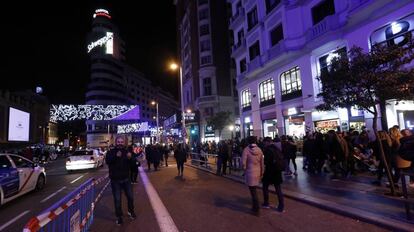Anti-system
No progress can be made without a crowd protesting over something that will be viewed as normal in five years
When Ahora Madrid, the coalition linked to anti-austerity party Podemos, took over City Hall last year, I was reminded of what happened when the BNG Galician nationalist party was elected to run Pontevedra. A lot of people reacted in the same way, as though towns and cities, like countries, should always be governed by the same people, even by people we don’t like, which is the essence of institutionalism: tolerating the opposition because we know who they are, almost as if they were one of us.

This explains why when former Prime Minister José Luis Zapatero immediately fulfilled his election pledge to pull Spanish troops out of Iraq, or passed a law granting same-sex couples marriage rights, or began peace talks with ETA, he was vilified and his first term in office considered little more than a victory for terrorism – Islamic or Basque terrorism, depending on his adversaries’ level of anger.
Zapatero had betrayed Spain and even betrayed the dead, to use the same words as Prime Minister Mariano Rajoy in parliament. Actually, what Zapatero had really done was betray a paralysis that had been ongoing since Spain emerged from its dictatorship. After all, nothing he did caused as much uproar as appealing for the rehabilitation of the victims of the Civil War.
If history teaches us one thing, it’s that progress always sparks scandal
Zapatero was no barbarian, although he flirted with it. Barbarians come from ideological latitudes where they survive without being tamed, unrecognizable in parties where unity is all. Which is why I thought of what happened in Pontevedra: in the end, the communists created pedestrian zones.
If history teaches us one thing, it’s that progress always sparks scandal: we can’t advance without a mob protesting about something that in five years will be the norm. If one day, City Hall decides to do the most logical thing that Madrid needs, which is to pedestrianize the city’s Gran Vía central thoroughfare, then we can expect to hear about how shops won’t be able to survive, how tourism will vanish, and how it will be the decline of civilization as we know it.
We’ve grown so used to seeing our cities gridlocked with cars that it seems that the anti-system thing to do is to fill it with people instead. And it is the same with laws.
English version by Nick Lyne.
Tu suscripción se está usando en otro dispositivo
¿Quieres añadir otro usuario a tu suscripción?
Si continúas leyendo en este dispositivo, no se podrá leer en el otro.
FlechaTu suscripción se está usando en otro dispositivo y solo puedes acceder a EL PAÍS desde un dispositivo a la vez.
Si quieres compartir tu cuenta, cambia tu suscripción a la modalidad Premium, así podrás añadir otro usuario. Cada uno accederá con su propia cuenta de email, lo que os permitirá personalizar vuestra experiencia en EL PAÍS.
¿Tienes una suscripción de empresa? Accede aquí para contratar más cuentas.
En el caso de no saber quién está usando tu cuenta, te recomendamos cambiar tu contraseña aquí.
Si decides continuar compartiendo tu cuenta, este mensaje se mostrará en tu dispositivo y en el de la otra persona que está usando tu cuenta de forma indefinida, afectando a tu experiencia de lectura. Puedes consultar aquí los términos y condiciones de la suscripción digital.









































